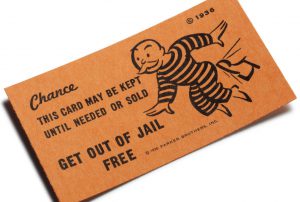When someone we love is accused of a crime and taken into custody, the most immediate issue in our minds is getting them somewhere safe outside of a jail. Family and friends are always rightly concerned about people they care about being confined amongst potentially dangerous people and in a place where they are in a poor place to defend themselves—both physically and legally.
Under Code § 19.2-120, every person “shall” be admitted to bail in Virginia “unless there is probable cause” to believe that the person will not appear in court or is dangerous either to himself (e.g., mental health issues) or to others (e.g., retaliation against witnesses, history of violent behavior). However, certain kinds of offenses being charges are always presumed to satisfy those requirements—violent felonies, drug dealing, firearms offenses for which there is a mandatory minimum prison sentence, felony domestic assault, and certain kinds of DUI. For these kinds of offenses, the person arrested will need a bond hearing as soon as a district court is in session again, typically the next business day.
If a person is facing pre-trial confinement, Code § 19.2-121 lists the different factors a court will consider when it decides whether to continue holding the person:
(i) the nature and circumstances of the offense;
(ii) whether a firearm is alleged to have been used in the offense;
(iii) the weight of the evidence;
(iv) the financial resources of the accused or juvenile and his ability to pay bond
(v) the character of the accused or juvenile including his family ties, employment or involvement in education;
(vi) his length of residence in the community;
(vii) his record of convictions;
(viii) his appearance at court proceedings or flight to avoid prosecution or failure to appear at court proceedings;
(ix) whether the person is likely to obstruct or attempt to obstruct justice, or threaten, injure, or intimidate, or attempt to threaten, injure, or intimidate a prospective witness, juror, or victim; and
(x) any other information available which the court considers relevant to the determination of whether the accused or juvenile is unlikely to appear for court proceedings.
Right now, with the country facing a pandemic of COVID-19, it is important to be able to explain to a court that an arrestee has the financial resources to support themselves if they do not work in an essential industry, like food production, medicine, or utilities. It is also critical to explain to a court why that person’s presence is critical to supporting children and other vulnerable parties who are depending on the arrestee’s support. Arrests nationwide are down as people remain indoors and out of public. But that means that, for those who are arrested, the presumption that they need to be confined is a high one. Many prosecutors and courts appreciate the dangers that COVID-19 poses to everyone, but they frequently need assurances that a person arrested doesn’t represent a risk of even more harm being outside jail.
Also critical during this pandemic is explaining to a court why an arrestee is at increased risk for complications from diseases like COVID-19. According to the CDC, pregnant women, the elderly, those who suffer chronic asthma, and those who are immunocompromised or suffering from kidney or liver disease all need to maintain greater social distancing to mitigate their chances of contracting this infection.
Therefore, it is critical that vulnerable arrestees receive prompt attention from an experienced team who can convince prosecutors and judges not to risk arrestees’—and others’—safety by continuing to hold people in jail.
If you or someone you care for has been arrested, would like to file a bond motion and needs immediate attention during these dangerous times, and you are in the Richmond, Henrico, Hanover or Chesterfield area, call the attorneys at Winslow & McCurry for a consultation at 804-423-1382 or email us at info@wmmlegal.com and we can help!
